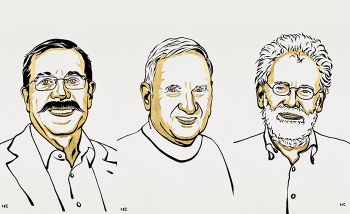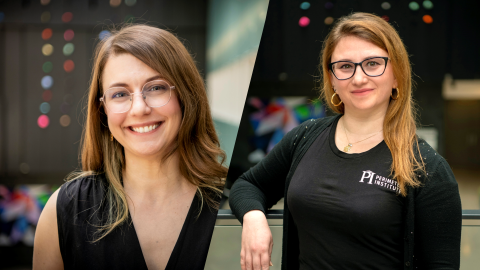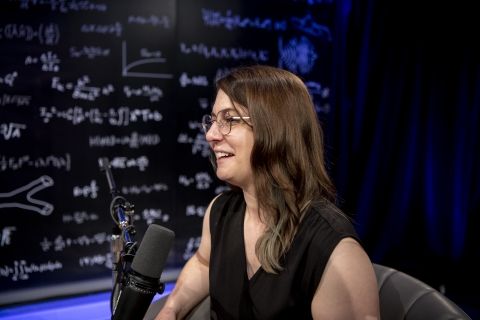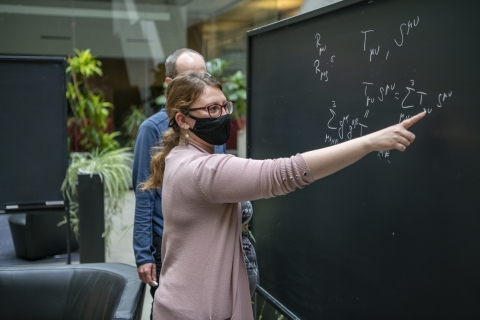Cosmologist Jessie Muir has been named Perimeter’s 2023 BMO Inclusive Excellence Postdoctoral Fellow, taking over the position from outgoing fellow Alessia Platania. The fellowship provides a year-long extension for postdoctoral fellows who demonstrate excellence in research, and an outstanding track record of fostering an inclusive environment.
“Building an inclusive environment at Perimeter, and in physics more generally, is absolutely a group effort. I’m honoured by this recognition of my contributions to that work and greatly appreciate the support this award will provide,” Muir says.
“The existence of this opportunity underlines Perimeter’s support of efforts to improve equity, diversity, and inclusion, which is important for ensuring that the Institute’s unique sense of community and support extends to a diverse group of physicists.”
As a Perimeter postdoctoral fellow, Muir works at the intersection of theory and data analysis, using measurements of the large-scale universe to learn about fundamental physics, including the nature of dark energy and dark matter.
In autumn 2022, she became co-chair of Perimeter’s Women in Physics working group. She planned, built, and implemented high-impact mentoring and networking events. She was a strong voice in shaping the Institute’s equity, diversity, and inclusion (EDI) policies, which are crucial to ensuring any physicist can thrive at Perimeter.
“Jessie Muir and Alessia Platania each showed dedication and willingness to contribute time, energy, and intellect to these activities. Their commitment to fostering greater inclusivity has truly benefited the PI community,” says Lucien Hardy, Chair of the fellowship selection committee. “Our first two Excellence Fellows have made a major impact on the institution.”
Alessia Platania set the standard for the fellowship, introducing several innovations that greatly improved inclusiveness at the Institute. In particular, she made exceptional contributions to the development of EDI through her position as quantum gravity seminar organizer, which she held for almost two years.
Within the seminar series, Platania ensured a diversity of speakers from different backgrounds, including a similar number of women and men. Moreover, she supplemented her weekly quantum gravity seminars with additional after-seminar meetings, to help postdocs and students identify and remove any barriers to participation.
Platania works on quantum gravity. Specifically, her research investigates and contrasts the quantum dynamics of different theories, and its implications for the structure of black holes and the early evolution of the universe.
“Theoretical physics is challenging. But people who are up to the challenge shouldn’t be held back because they’re systemically excluded or discouraged,” Platania says of the relationship between research and EDI.
“The physics community in general still has a lot of work to do to become more inclusive. Perimeter’s initiatives not only improve the Institute’s environment, but also increase awareness on what the broader science community can do to foster EDI. I’m grateful to the Institute for the opportunity to be part of this ongoing effort, and for the support and recognition that came with the fellowship’s award.”
The BMO fellowship provides a Perimeter postdoctoral fellow in their final or penultimate year with an additional year of funding to carry on their research and EDI activities.
“BMO is committed to driving progress toward gender inclusion, and this fellowship is helping a new generation of researchers reach their full potential,” said Helen Seibel, Head of Community and Employee Giving at BMO. “The partnership between BMO and Perimeter Institute exemplifies how we continue to live our Purpose to Boldly Grow the Good in business and life.”
In addition to this fellowship, Perimeter supports a wide range of other initiatives, guided by the framework set out in its Strategic Plan for EDI. To empower a Perimeter community in which everyone can contribute fully, the Institute sponsors and hosts conferences, camps, and workshops devoted to women in physics; cultivates diversity and gender equity in its master’s and PhD programs; and provides outreach and training resources for historically excluded and equity-deserving groups. These initiatives are motivated both by principles of social justice, and the understanding that physics progresses when systemic barriers to contributing are removed.
À propos de l’IP
L'Institut Périmètre est le plus grand centre de recherche en physique théorique au monde. Fondé en 1999, cet institut indépendant vise à favoriser les percées dans la compréhension fondamentale de notre univers, des plus infimes particules au cosmos tout entier. Les recherches effectuées à l’Institut Périmètre reposent sur l'idée que la science fondamentale fait progresser le savoir humain et catalyse l'innovation, et que la physique théorique d'aujourd'hui est la technologie de demain. Situé dans la région de Waterloo, cet établissement sans but lucratif met de l'avant un partenariat public-privé unique en son genre avec entre autres les gouvernements de l'Ontario et du Canada. Il facilite la recherche de pointe, forme la prochaine génération de pionniers de la science et communique le pouvoir de la physique grâce à des programmes primés d'éducation et de vulgarisation.
Ceci pourrait vous intéresser
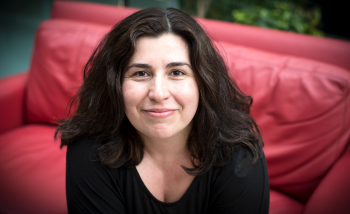

Des percées en astrophysique récompensées par le Prix Brockhouse du Canada
octobre 25, 2022
